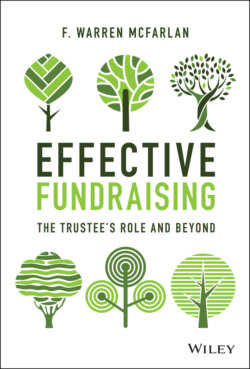Читать книгу Effective Fundraising - F. Warren McFarlan - Страница 9
1 Asking for Money
ОглавлениеOVERWHELMINGLY, WHEN ONE is asked to join the board of a social enterprise, the reaction is one of pleasure and personal pride even if one's other commitments do not allow one to accept. The opportunity to contribute time, energy, and money to an important community or civic enterprise is seen as exciting. Your sense of self-worth is validated by the invitation. Very often, however, one's second comment to the invitation runs along the lines of “I don't have to ask people for money, do I?” Asking for money somehow seems demeaning and distasteful to many individuals. Also the idea of being rejected by a prospective donor is often very personally threatening to one's self-esteem. Even high-powered, otherwise highly self-confident people can turn to jelly when having to ask people for money. A global banker who has put together deals all around the world, described to the author visibly breaking into a cold sweat when forced to solicit other CEOs for seven-figure gifts for charities of mutual interest. He was not used to being a supplicant and did not like it. In his new autobiography What It Takes,1 Steve Schwarzman, chairman of Blackstone and a billionaire, describes how hard it was for him to first raise funds for Blackstone, and then for the Schwarzman Scholars Program at Tsinghua University in China as he faced rejection after rejection on cold-call solicitations. From top to bottom, there is a common drumbeat of distaste for personal fundraising, which is one of many reasons why professional fundraisers are so well compensated. Yet, without it, otherwise successful organizations can wither and die. In other cases, it is vital to the organization's growth and impact.
